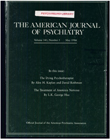A clinical report of thymoleptic-responsive atypical paranoid psychoses
Abstract
The paranoid disorders of five patients remitted after treatment with thymoleptic agents despite the absence of a full affective syndrome. Their clinical symptoms at admission included suspiciousness, hypervigilance, ideas of reference, hostility, belligerence, and delusions of persecution or of infidelity. Some had phasic disturbances with somatic complaints or prominent phobic anxiety symptoms, a family history of affective disorder, or prior responses to thymoleptic drugs. These observations suggest that some patients with paranoid psychosis who do not have a full DSM-III affective syndrome may respond to antidepressant pharmacotherapy alone, i.e., without neuroleptics. Systematic, prospective studies of this phenomenon would help to ascertain diagnostic criteria for such patients and the range of therapeutic responses.
Access content
To read the fulltext, please use one of the options below to sign in or purchase access.- Personal login
- Institutional Login
- Sign in via OpenAthens
- Register for access
-
Please login/register if you wish to pair your device and check access availability.
Not a subscriber?
PsychiatryOnline subscription options offer access to the DSM-5 library, books, journals, CME, and patient resources. This all-in-one virtual library provides psychiatrists and mental health professionals with key resources for diagnosis, treatment, research, and professional development.
Need more help? PsychiatryOnline Customer Service may be reached by emailing [email protected] or by calling 800-368-5777 (in the U.S.) or 703-907-7322 (outside the U.S.).



